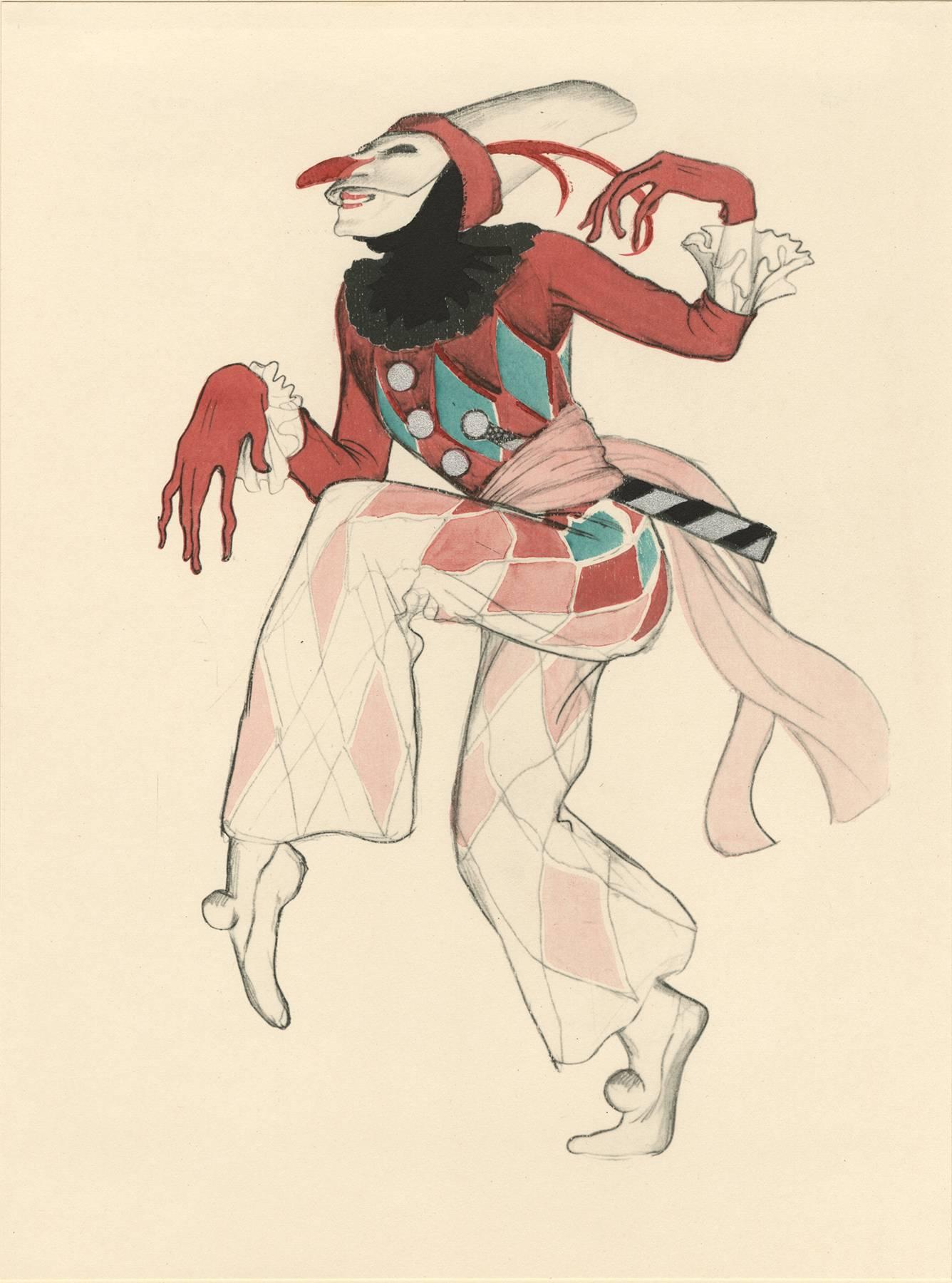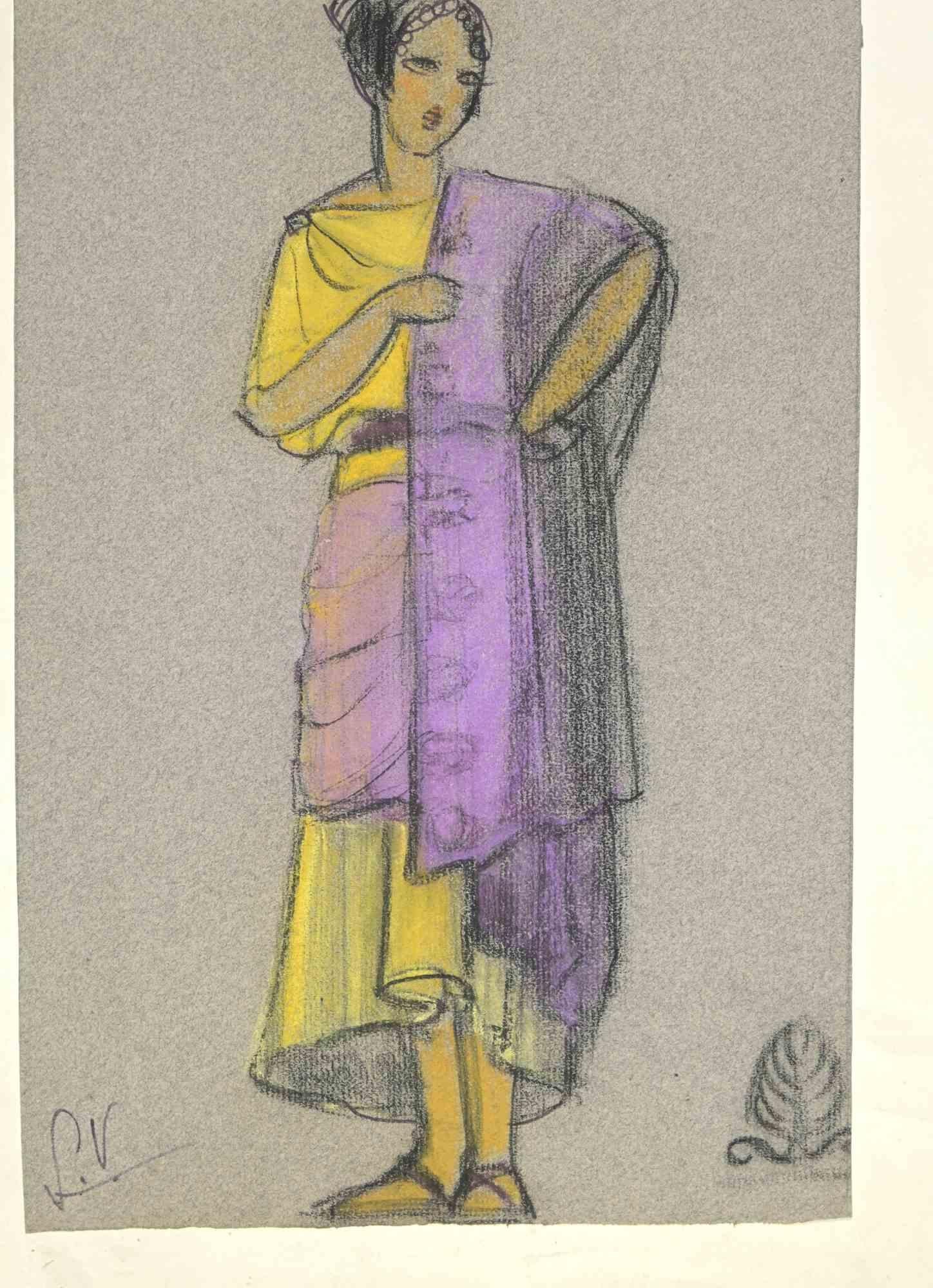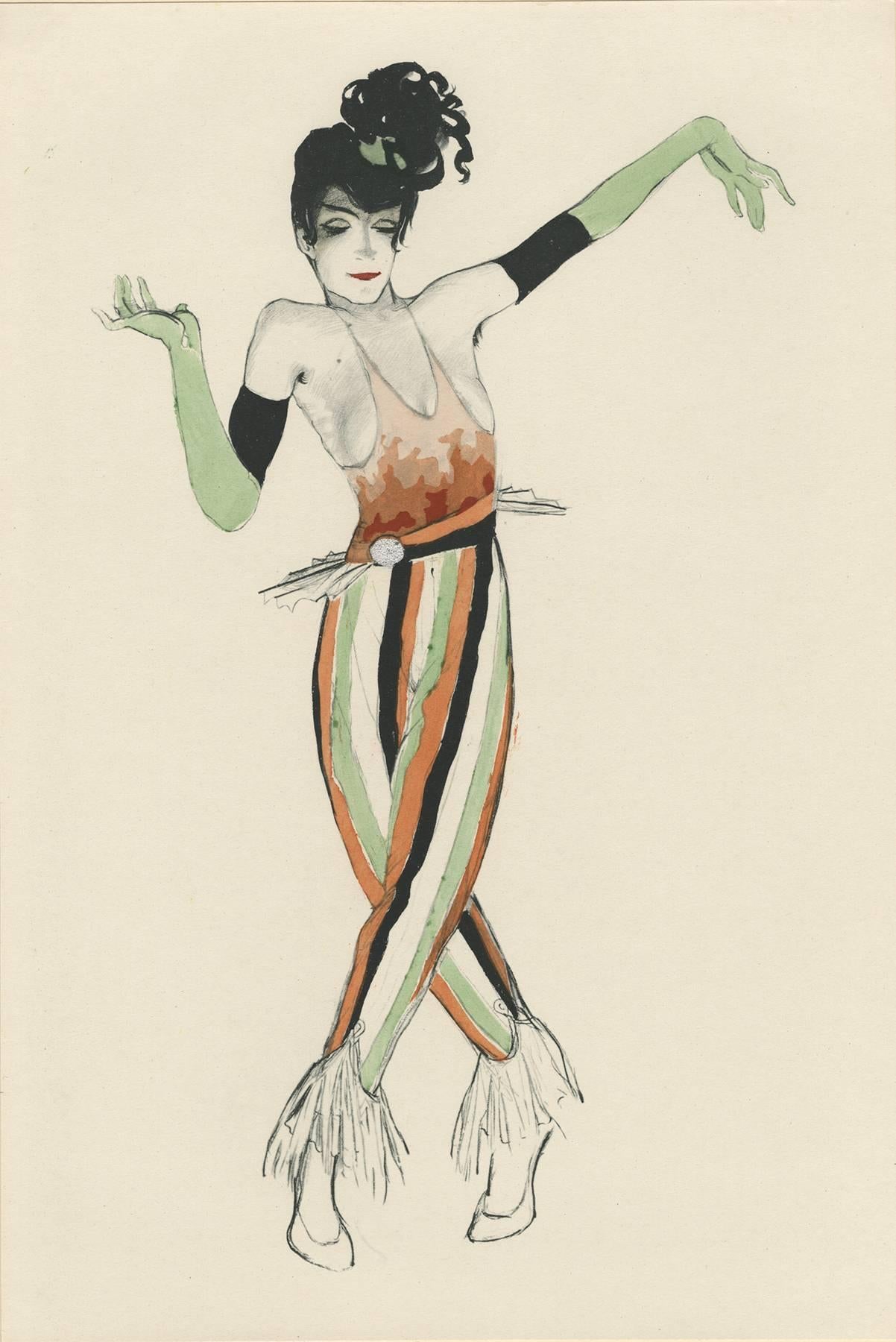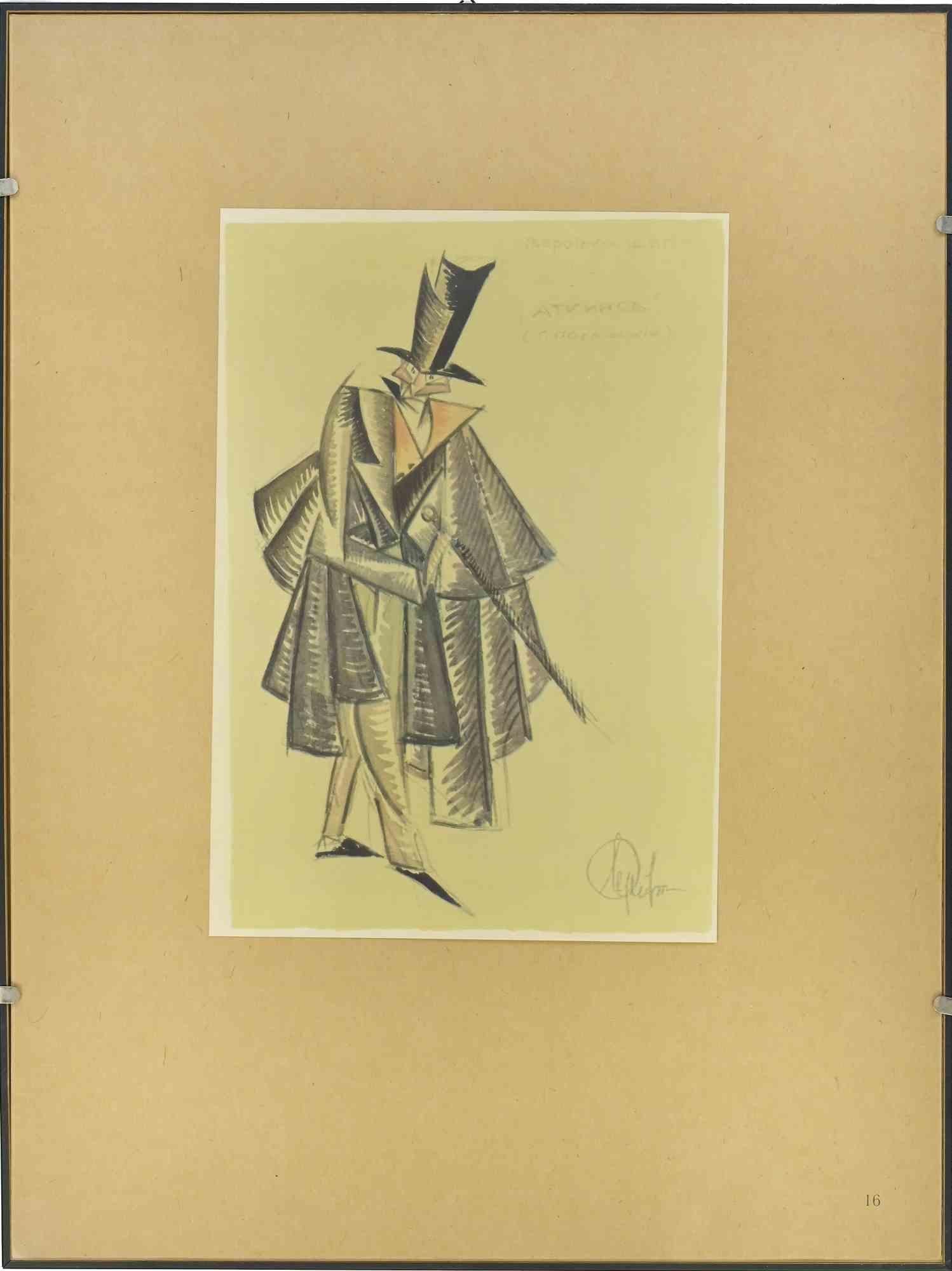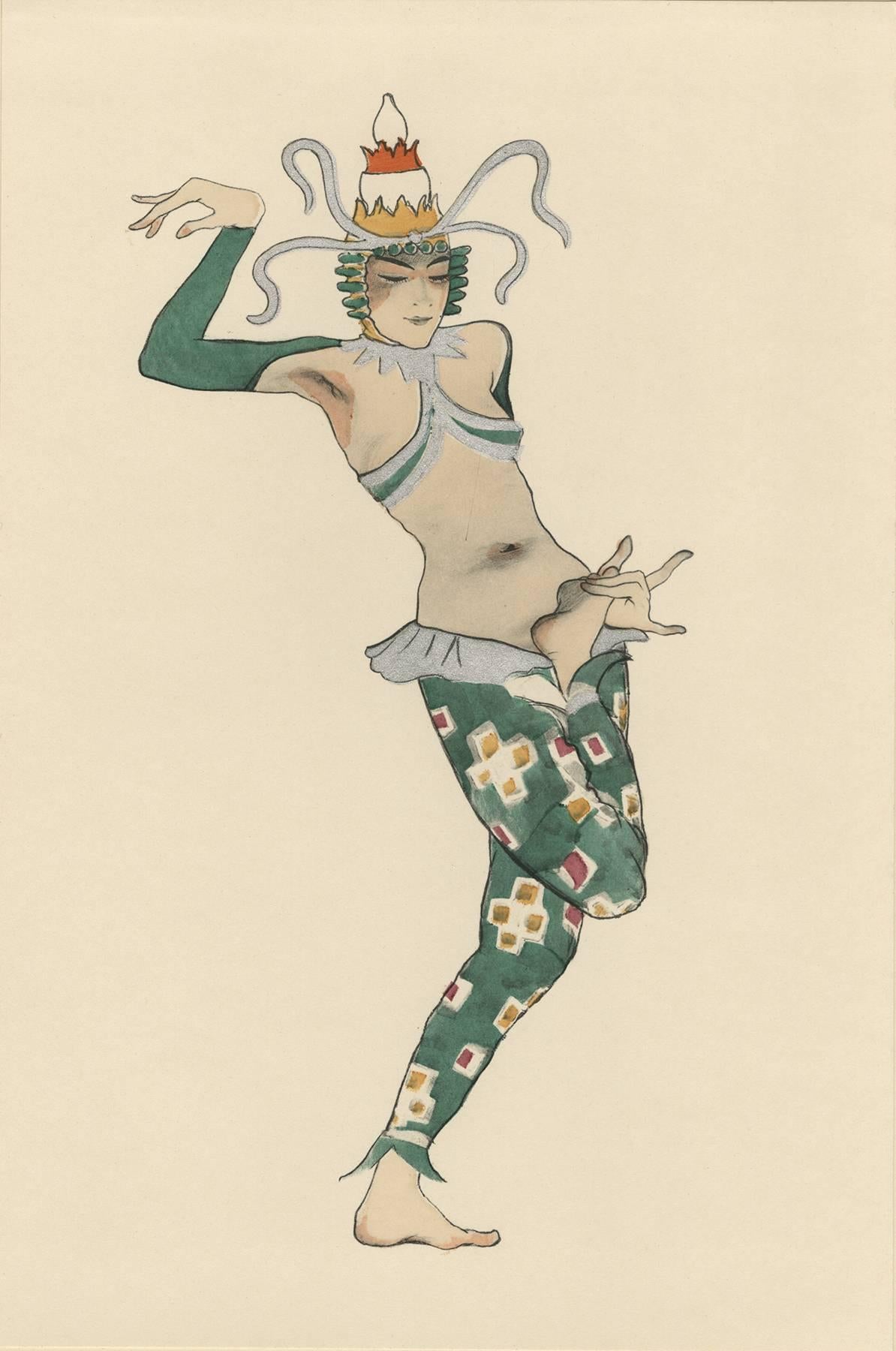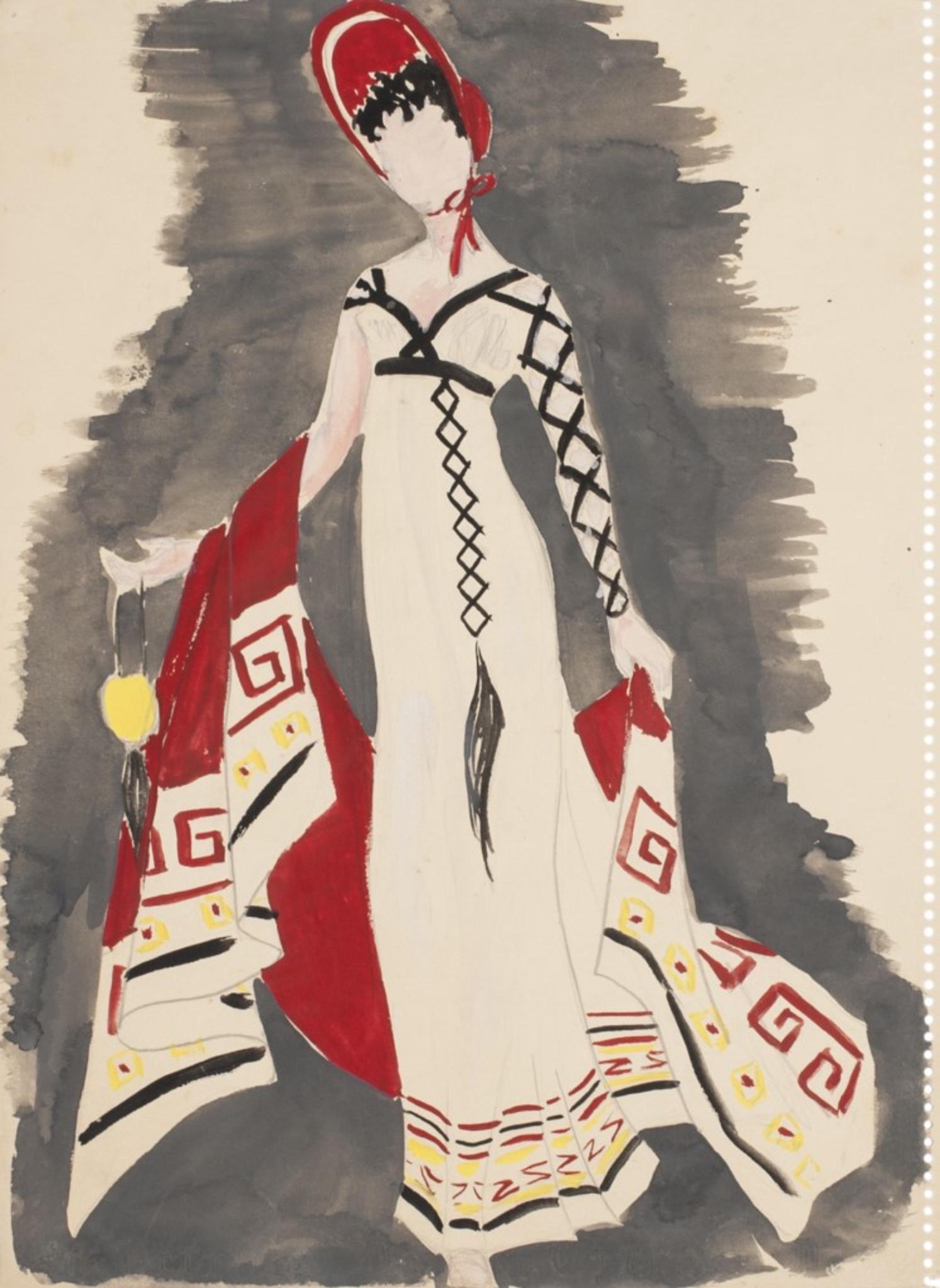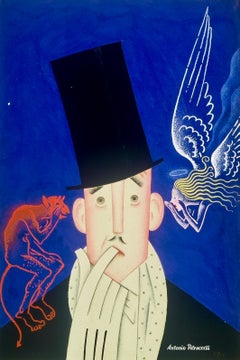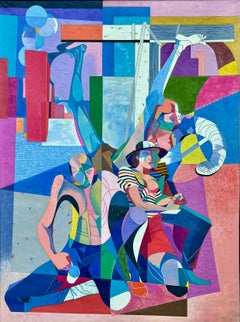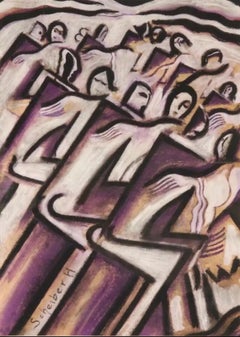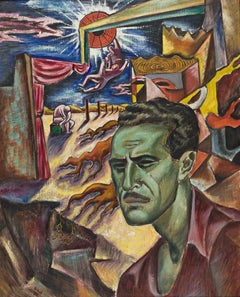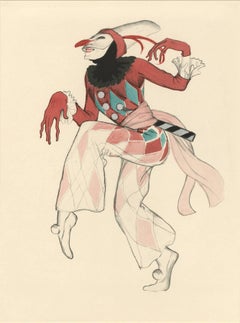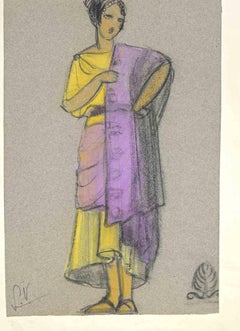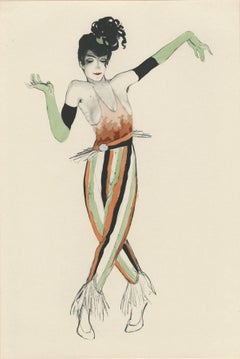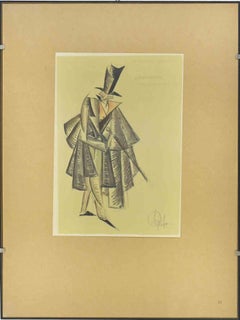Items Similar to Yiddish Theatre Cubist Costume Design 1924 Deco Color Field Modernism Broadway
Want more images or videos?
Request additional images or videos from the seller
1 of 13
Boris AronsonYiddish Theatre Cubist Costume Design 1924 Deco Color Field Modernism Broadway1924
1924
$8,500
£6,391.32
€7,421.87
CA$11,870.07
A$13,164.79
CHF 6,913.50
MX$161,672.96
NOK 87,518.36
SEK 82,530.99
DKK 55,375.29
Shipping
Retrieving quote...The 1stDibs Promise:
Authenticity Guarantee,
Money-Back Guarantee,
24-Hour Cancellation
About the Item
Yiddish Theatre Cubist Costume Design 1924 Deco Color Field Modernism Broadway.
Boris Aronson (1898 – 1980) "Day and Night," 17 ½ x 13 inches. Gouache and watercolor on paper, 1924. Exhibited: Royal Shakespeare Company, Label verso.
Boris Aronson (October 15, 1898 - November 16, 1980) was an American scenic designer for Broadway and Yiddish theatre. He won the Tony Award for Scenic Design six times in his career.
The son of a Rabbi, Aronson was born in Kiev, in the Russian Empire now Ukraine, and enrolled in art school during his youth. Aronson became an apprentice to the designer Aleksandra Ekster, who introduced him to the directors Vsevolod Meyerhold and Alexander Tairov, who influenced him. These three theatre and art veterans were advocates of the Constructivist school in Russia, as opposed to Stanislavski's form of Realism, and they convinced Aronson to embrace the Constructivist style.
Aronson worked for some years in Moscow and Germany. In Berlin he exhibited at the seminal Van Diemen Gallery "First Exhibition of Russian Art", alongside the Constructivists El Lissitzky and Naum Gabo, which introduced Constructivism to the West. He wrote two books in Berlin, on Marc Chagall and Jewish graphic art, before he obtained an immigration visa for America in 1923.
He moved to the Lower East Side in New York City and began designing sets and costumes for the more experimental of the city's Yiddish theatres, including the Unser Theater, the Schildkraut Theatre, and most notably Maurice Schwartz's Yiddish Art Theatre. He achieved fame in New York's Jewish community when he designed Schwartz's 1926 revival of Abraham Goldfaden's play The Tenth Commandment. Although he shunned politics, Aronson produced sets for the Communist affiliated ARTEF (Arbeiter Teater Farband, Workers' Theatre Union), such as Lag Boymer and Jim Kooperkop in 1930. However, he soon after left the Yiddish Theatre to prevent his work's "ghettoization", and debuted on Broadway, in 1932, with a revival of Vernon Duke and Yip Harburg's Walk a Little Faster. During the 1930s, he worked on productions by the Group Theatre, including works by Clifford Odets and Irwin Shaw.
From 1934 to 1952, Aronson designed scenes, costumes, and lighting for thirty-four plays and three musicals on Broadway (including his design for what is considered to be the first "concept musical", Kurt Weill and Alan Jay Lerner's Love Life), but those successes were overshadowed by his work for the original 1953 production of The Crucible and the 1955 The Diary of Anne Frank (a play by Frances Goodrich and Albert Hackett based on Anne Frank: The Diary of a Young Girl).
He continued work on Broadway into the 1960s and 1970s with musicals including Do Re Mi, Fiddler on the Roof (for which Aronson returned to his earlier experience with Jewish theatre), Cabaret, Zorba, Company, Follies, A Little Night Music, and Pacific Overtures. He won the Drama Desk Award for Outstanding Set Design three times.
Aronson designed sets for the Metropolitan Opera and ballet companies, including the production of The Nutcracker choreographed by Mikhail Baryshnikov. He was also a non-theatrical artist, working as a painter and sculptor. At the time of his death in 1980, he was a member of New York's theatre and art community and one of its designers. Aronson's wife was Lisa Jalowetz, who worked on many of Aronson's shows as his assistant.
DAY AND NIGHT1, Sholom Ansky
(Yiddish: Tog un nakht)
Here is the cast from the Unser Theatre production of Ansky's "Day and Night," when it opened at the Yiddish Art Theatre in New York City, on December 9, 1924:
Avigdor (Victor) Pecker, Jacob Bleifer, Jacob Bergreen, Wolf Ayzenberg, Joseph Greenberg, I. Lowstein, Isaac Rotblum, Miriam Elias, Esther Mendel, Chaim Schneyer, Asher Polonovsky and Goldie Russler.
So, here is the synopsis of Ansky's "Day and Night." The name of the actor or actress who portrayed a particular role is indicated in parentheses:
SYNOPSIS
ACT 1:
The Rabbi (Chaim Schneyer) has done nothing to stop the children's epidemic raging in the town. In answer to Mendel (Jacob Bergreen), the matchbroker's queries, Hananiah (Avigdor Pecker) describes the Rabbi as a silent recluse, different from his father who died a martyr's death in a massacre. The beadle (Wolf Ayzenberg) comes to fetch the Rabbi to a wedding ceremony to be held in the cemetery as a means of checking the plague. Hananiah replies that the Rabbi will not come. A stranger (Joseph Greenberg) enters, contrary to Hananiah's orders, to implore the Rabbi's aid for his sick child. He is allowed to touch the Rabbi's door and mutely commune with him. The wedding party arrives from the cemetery, Hananiah goes into the Rabbi's room, but immediately returns, telling the party to proceed with the ceremonial dance. After the dance the party leaves.
Deborah (Miriam Elias), the Rabbi's old mother, comes in and promises to consult her son about the match for Miriam (Esther Mandel). Hananiah and the others leave. Miriam, her grandchild, enters, terror-stricken at the plague. When told of the proposed match, she protests wildly and runs off. Rabbi Don, attracted by sounds of Miriam's weeping, enters. Deborah tells of Miriam's refusal and begs him to stay with her. She is kept alive by his prayers, but would rather die. He suspects a secret and demands to know it. She denies any secret and leaves, frightened by his angry face. Miriam enters. In the ensuing conversation they reveal a subconscious love and suppressed desire for each other.
Hananiah brings the news that the Prince of Darkness with his suite celebrates nightly orgies in the ruins of an old mill and is surely the cause of the plague. The Rabbi bids him go there that night to see for himself.
ACT 2:
The ruins of the old mill--Devils tell of their achievements and are sure that Satan will be pleased. He enters and asks for reports. One reports of the carnage he has staged among animals. Another of the fear and hatred he has spread among men. Only the third messenger, sent to vanquish the Rabbi, is missing. Satan (Sidney Stavrov) and Lilith (Lisa Varon) grow impatient. Finally he appears, victorious in having stirred the blood of a Cossack in the Rabbi, aroused his sinful desire for his niece. The orgy starts, Rabbi Don appears and joins in it. Miriam follows. He embraces her. A cock crows; all disappear.
ACT 3:
Hananiah tells the Rabbi his experience. The Rabbi is shocked at his own part in the orgy. He calls Miriam and asks her about her dreams. She does not remember, but thinks she saw him. the Rabbi s sure that Hananiah has sold himself to the Devil. Deborah, entering upon this conversation, collapses. She becomes delirious and discloses the secret of her life. In the massacre in which her husband was murdered, she was raped, and the Rabbi is the son of the Cossack. This revelation kills the Rabbi.
- Creator:Boris Aronson (1898 - 1980, American)
- Creation Year:1924
- Dimensions:Height: 31 in (78.74 cm)Width: 25 in (63.5 cm)Depth: 2 in (5.08 cm)
- Medium:
- Movement & Style:
- Period:
- Condition:
- Gallery Location:New York, NY
- Reference Number:1stDibs: LU1156210034572
About the Seller
5.0
Gold Seller
Premium sellers maintaining a 4.3+ rating and 24-hour response times
Established in 2008
1stDibs seller since 2019
192 sales on 1stDibs
Typical response time: <1 hour
- ShippingRetrieving quote...Shipping from: New York, NY
- Return Policy
Authenticity Guarantee
In the unlikely event there’s an issue with an item’s authenticity, contact us within 1 year for a full refund. DetailsMoney-Back Guarantee
If your item is not as described, is damaged in transit, or does not arrive, contact us within 7 days for a full refund. Details24-Hour Cancellation
You have a 24-hour grace period in which to reconsider your purchase, with no questions asked.Vetted Professional Sellers
Our world-class sellers must adhere to strict standards for service and quality, maintaining the integrity of our listings.Price-Match Guarantee
If you find that a seller listed the same item for a lower price elsewhere, we’ll match it.Trusted Global Delivery
Our best-in-class carrier network provides specialized shipping options worldwide, including custom delivery.More From This Seller
View AllOriginal Painting. New Yorker Mag Cover Proposal WPA Mid Century American Scene
By Antonio Petruccelli
Located in New York, NY
Original Painting. New Yorker Mag Cover Proposal WPA Mid Century American Scene
Antonio Petruccelli (1907 – 1994)
Perplexed Gentleman
New Yorker cover proposal, c. 1939
13 1/4 X 8 ...
Category
1930s American Modern Figurative Paintings
Materials
Gouache, Board
Figurative Cubist Surrealist Abstraction Mid 20th Century American Modern Large
By O. Louis Guglielmi
Located in New York, NY
Figurative Cubist Surrealist Abstraction Mid 20th Century American Modern Large
O. Louis Guglielmi (1906 - 1956)
OBSESSIVE THEME
44 x 33 inches
Oil on canvas
Signed and dated '48 lo...
Category
1940s American Modern Abstract Paintings
Materials
Canvas, Oil
Deco Dancing Hungarian Expressionism European Drawing Modernism Figurative Dance
By Hugó Scheiber
Located in New York, NY
Deco Dancing Hungarian Expressionism European Drawing Modernism Figurative Dance. 22 1/2 x 16 inches. Signed lower left. Framed.
BIO
Hugó Scheiber was born in Budapest in 1873. At the age of eight, he moved with his family from Budapest to Vienna.
In 1898, to help support his family after they had returned to Budapest. He started working during the day, attending painting classes at the Commercial Art School in the evening. In 1900, he completed his studies.
Scheiber showed an early interest in German Expressionism and Futurism. In 1915 he met Marinetti, who invited him to join the Futurist movement. Because Scheiber's paintings conflicted with academic style of the Hungarian art establishment, his work was virtually ignored in his own country. In 1919, he and his friend Béla Kádár held an exhibition organized by Hévesy in Vienna, which was a great success, so much so that the Budapest Art Museum purchased two of his drawings.
In 1920, Scheiber returned to Vienna. A turning point in his career came in 1921 when Herwarth Walden, founder of Germany's leading avant-garde periodical, Der Sturm...
Category
1920s Art Deco Figurative Drawings and Watercolors
Materials
Paper, Gouache
"Drama Teacher" 1938 WPA Mid 20th Century American Theatre Surrealism Modernism
By Leon Bibel
Located in New York, NY
"Drama Teacher" 1938 WPA Mid 20th Century American Theatre Surrealism Modernism. 30 x 24 inches. Oil on Canvas. Signed land dated ’38 lower left.
The photograph in the listing depicts the artist's friend who taught drama and about whom the painting is based
Painter, printmaker and sculptor, Leon Bibel was born in San Francisco in 1913. He trained at the California School of Fine Arts and received a scholarship to study under the German Impressionist Maria Riedelstein. He worked in collaboration with Bernard Zackheim, a student of Diego Rivera, to create frescoes for the San Francisco Jewish Community Center and the University of California Medical School.
In 1936 Bibel moved from California to join the Federal Art Project at Harlem Art...
Category
1930s American Modern Figurative Paintings
Materials
Canvas, Oil
Original Painting. Vanity Fair Illustration Proposal. Art Deco Modern 1930s
By Antonio Petruccelli
Located in New York, NY
Original Painting. Vanity Fair Illustration Proposal. Art Deco Modern 1930s
Antonio Petruccelli (1907 - 1994)
Vanity Fair
Illustration proposal, c 1930’s
18 X 13 3/4 inches (sight)
...
Category
1930s American Modern Figurative Paintings
Materials
Gouache, Board
Bless You All Tony Award Broadway Costume Design Mid 20th Century Theatre Modern
Located in New York, NY
Bless You All Tony Award Broadway Costume Design Mid 20th Century Theatre Modern.
Miles White (1915 – 2000) "Bless You All," 15 x 11 (sight) inches. Mixed media on paper. The musical opened December 13, 1950 at the Mark Hellinger Theatre. Miles won the 1951 Tony Award for Costume Design.
Miles was one of my closest friends for the last 20 years of his life. We live with one of his two Tony Awards and a dozen drawings.
BIO
White was a top Broadway and Hollywood costume designer. The artist created the costumes for the original Broadway productions of OKLAHOMA, CAROUSEL, PAL JOEY and BYE BYE BIRDIE...
Category
1950s Performance Figurative Drawings and Watercolors
Materials
Paper, Ink, Watercolor, Gouache
You May Also Like
Ballet und Pantomime "Harlekin", plate #10.
By Walter Schnackenberg
Located in Chicago, IL
Walter Schnackenberg’s style changed several times during his long and successful career. Having studied in Munich, the artist traveled often to Paris where he fell under the spell of the Henri de Toulouse-Lautrec’s colorful and sensuous posters depicting theatrical and decadent subjects. Schnackenberg became a regular contributor of similar compositions to the German magazines Jugend and Simplicissimus before devoting himself to the design of stage scenery and costumes. In the artist’s theatrical work, his mastery of form, ornamentation, and Orientalism became increasingly evident. He excelled at combining fluid Art Nouveau outlines, with spiky Expressionist passages, and the postures and patterns of the mysterious East.
In his later years, Schnackenberg explored the unconscious, using surreal subject matter and paler colors that plainly portrayed dreams and visions, some imbued with political connotations. His drawings, illustrations, folio prints, and posters are highly sought today for their exceedingly imaginative qualities, enchanting subject matter, and arresting use of color.
SCHNACKENBERG BALLET UND PANTOMIME...
Category
1920s Art Deco Figurative Prints
Materials
Paper
Theatrical Costume - Drawing by Simone Vaulpré - Early 20th Century
Located in Roma, IT
Theatrical Costume is a drawing made by Simone Vaulpré during the early 20th century.
Charcoal and pastel Hand signed.
Good condition apart from some tears in the lower part.
The ...
Category
Early 20th Century Modern Figurative Drawings and Watercolors
Materials
Charcoal
Ballet und Pantomime "Scherzo II", plate #15.
By Walter Schnackenberg
Located in Chicago, IL
Walter Schnackenberg’s style changed several times during his long and successful career. Having studied in Munich, the artist traveled often to Paris where he fell under the spell o...
Category
1920s Art Deco Figurative Prints
Materials
Paper
Sketch for a theatrical Costume after Sergei Eisenstein - Mid-20th Century
Located in Roma, IT
Sketch for a theatrical Costume is a modern artwork realized after Sergei Eisenstein in the mid-20th Century.
Mixed colored phototype print.
Includes frame: 45 x 34 cm
Fair condit...
Category
Mid-20th Century Contemporary Animal Prints
Materials
Photogravure
Ballet und Pantomime "Bingha", plate #8.
By Walter Schnackenberg
Located in Chicago, IL
Walter Schnackenberg’s style changed several times during his long and successful career. Having studied in Munich, the artist traveled often to Paris where he fell under the spell of the Henri de Toulouse-Lautrec’s colorful and sensuous posters depicting theatrical and decadent subjects. Schnackenberg became a regular contributor of similar compositions to the German magazines Jugend and Simplicissimus before devoting himself to the design of stage scenery and costumes. In the artist’s theatrical work, his mastery of form, ornamentation, and Orientalism became increasingly evident. He excelled at combining fluid Art Nouveau outlines, with spiky Expressionist passages, and the postures and patterns of the mysterious East.
In his later years, Schnackenberg explored the unconscious, using surreal subject matter and paler colors that plainly portrayed dreams and visions, some imbued with political connotations. His drawings, illustrations, folio prints, and posters are highly sought today for their exceedingly imaginative qualities, enchanting subject matter, and arresting use of color.
SCHNACKENBERG BALLET UND PANTOMIME...
Category
1920s Art Deco Figurative Prints
Materials
Paper
Theatrical Construction - Original Painting by Alkis Matheos - 20th Century
By Alkis Matheos
Located in Roma, IT
Theatrical Construction is an original painting artwork in mixed media, tempera and watercolor on paper, realized by the Greek-French artist Alkis Matheos .
Very good conditions.
N...
Category
20th Century Modern Figurative Paintings
Materials
Mixed Media, Tempera, Watercolor
